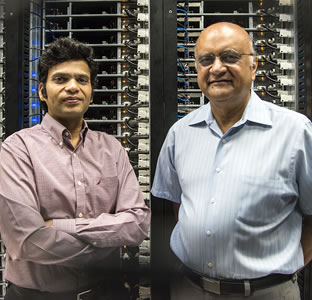UTSA awarded $500,000 National Science Foundation grant to study cloud computing

Ram Krishnan and Ravi Sandhu

Ram Krishnan and Ravi Sandhu
(Sept. 15, 2014) -- Ram Krishnan, assistant professor of electrical engineering in the UTSA College of Engineering, and Ravi Sandhu, Lutcher Brown Distinguished Chair in Cyber Security in the College of Sciences and director of the UTSA Institute for Cyber Security, have been awarded a $500,000 grant from the National Science Foundation (NSF) to improve the security of cloud-based infrastructures.
"Our research really complements what is already going on here at UTSA," said Krishnan. "Receiving this NSF grant allows us to share the groundbreaking research taking place at UTSA with the nation and the world."
Krishnan's expertise is in computer and network security, specifically in access control and security issues in cloud computing. When organizations move to the cloud, they also need to move their security to the cloud. Krishnan says that the goal of the NSF project is to develop a security mechanism where each cloud customer could maintain a level of control over their virtual assets in the cloud that is comparable to the level of control that was possible to maintain via their own premises.
Sandhu is a world-renowned cyber security expert whose research focuses on attribute-based access control and its applications in cloud computing, social computing and secure information sharing. He holds 29 patents, has authored more than 235 papers and been cited more than 25,000 times.
"The cloud revolution in computing will be much bigger than the PC and Internet revolutions of the past," said Sandhu. "Cloud technologists face three crucial problems: how to build and operate the cloud, how to use the cloud profitably for diverse applications and how to secure the cloud. UTSA scholars are working hard to be leaders in all three aspects and this grant will help foster that goal."
"Imagine a computer that you don't physically own but that is virtually available somewhere else," explained Krishnan. "You can only access the information on that computer through a network. For example, our UTSA email is hosted off-site on Microsoft servers. The information does not exist on each employee's personal computers; the data is held on Microsoft's cloud. That is the kind of system we are talking about."
Krishnan explained that having a person or company's extremely sensitive resource data located thousands of miles away and accessible through a cloud network presents challenges problem when it comes to security and accessibility.
"For a service provider like Amazon or Google that is hosting the data of multiple companies, there must be a system that determines who gets access to what information," said Krishnan. "The service provider has to figure out how they determine and control the access that the users have. We want to develop specialty access control so that a company can define the attributes of a user, which, in turn, determines that user's access."
Not only will the grant benefit UTSA research, but the educational potential of the grant will be a boon to students who will receive hands-on experience in state-of-the-art technologies, possibly in organized courses, dedicated to this topic in the near future.
"Today, if you are a graduate or an undergraduate student, it is so important to have some experience and knowledge of what cloud computing is and how to use the technology," said Krishnan. "The security aspects of cloud computing are especially a great topic to learn if you are an outgoing student, looking to work for one of these large service providers. Both the research and the educational aspects of this funded project are fantastic."
The Institute for Cyber Security is one dedicated UTSA center focused on solving global security challenges in today's increasingly technological world. In early 2014, UTSA's cybersecurity program was ranked No. 1 in the nation by a national survey of technology security professionals conducted by the Ponemon Institute.
UTSA is home to the Cloud and Big Data Laboratory, a space devoted to the research of new technologies and innovations in various areas of computing and big data research and development. The laboratory, developed in large part through industry collaboration, is designed to help the international business community improve its computing platforms through open-source hardware and cloud and big data technologies, and train a pipeline of students for the workforce.
-------------------------------
Connect online with UTSA on Twitter, Facebook, YouTube and Instagram.
Events
The 2025 edition of the Symposium will take place March 14 – 16 in the beautiful city of San Antonio, hosted by UTSA. We are thrilled to bring a variety of programming and performances by distinguished concert artists from around the world.
UTSA Recital Hall, Main CampusThis beginner-friendly workshop teaches basic sewing and quilting skills along with the history of the craft.
Santikos Building, Hall 150, UTSA Southwest CampusJoin UTSA Libraries for a virtual workshop for EndNote users who have mastered the basics but would like to learn about more advanced features the program can offer.
Virtual Event (Zoom)Join UTSA Libraries for a virtual workshop for EndNote users who have mastered the basics but would like to learn about more advanced features the program can offer.
Group Spot B, John Peace LibraryStudents, faculty and staff are invited to join UTSA's delegation at the annual César E. Chávez March for Justice in downtown San Antonio. Free transportation will be provided from the Main and Downtown Campuses, and all university community participants will receive a complimentary commemorative t-shirt (while supplies last)
1310 Guadalupe Street, San Antonio, TexasJoin UTSA Libraries and Museums to learn more about the publishing discounts available for UTSA researchers.
Virtual Event (Zoom)PubMed is an essential database for anyone conducting biomedical or health-related research. This workshop will teach attendees how to effectively navigate this free resource and locate peer-reviewed articles using advanced search features, MeSH subject headings, and Boolean operators.
Virtual Event (Zoom)

